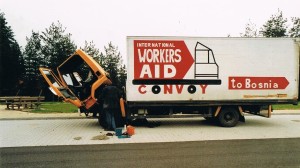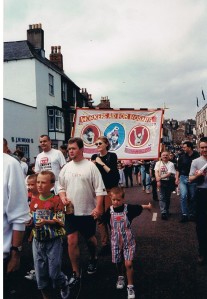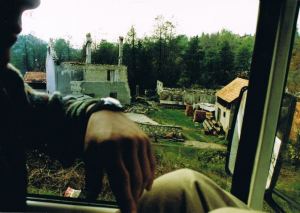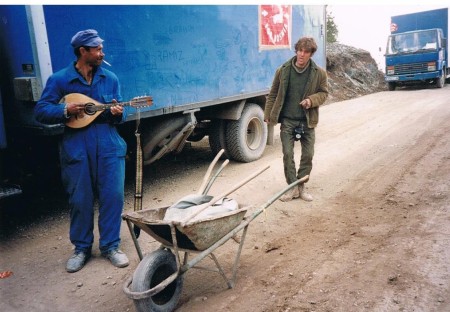 |
| Workers’ Aid lorries were all second hand! |
This is reblogged with permission from People and Nature.
By Gabriel Levy
 |
| Workers’ Aid marching with Bosnian refugees at the Durham Miners’ Gala, 1995 |
In my view, these activists are taking forward the best traditions of the international working-class movement. One experience worth looking back to is that of Workers Aid for Bosnia, a group of labour movement activists, initially based in the UK, that in 1993 collected truck-loads of humanitarian aid and took them to the Bosnian mining town of Tuzla, which at that time was surrounded on three sides by the Serbian army.
Here is an interview with two of its organisers: JOHN DAVIES, a writer, actor and activist who lives in Liverpool and BOB MYERS, an activist based in Manchester.
Gabriel Levy: please explain how the Workers Aid convoys came about. Who proposed them, who acted on the proposal? What was the situation in Bosnia at the time, and how did the convoys impact on it?
John Davies: The Workers Aid convoys were organised in response to an appeal by a Serb socialist, Rade Pavlovic, who was appalled at the atrocities being carried out by the Serb nationalist/Stalinist leadership, and with the widespread support of the Serb intelligentsia.
Knowing of the way in which miners in former Yugoslavia had responded to an appeal for support from British miners during their great strike in 1984-85, Rade suggested reciprocal solidarity to the Bosnian miners. He also drew attention to the even older tradition of working class solidarity in Bosnia, going back to 1922, when Bosnian miners hid miners from Slovenia, Rumania and Hungary who were threatened with deportation for going on strike.
In Britain we started organising among the unions, the Muslim community, and on the streets.
We campaigned on the road, once we had purchased our first second-hand trucks, collecting at supermarkets, asking people to buy an extra item, and to make a donation for diesel. Because of the influence of the Communist Party, who saw Milosevic and his Greater Serbia fascists as somehow defending “socialist Yugoslavia”, support in the unions was patchy, particularly at leadership level. However, individual branches made donations and the campaign grew, and by the summer of 1993 there were campaigns in several European countries.
At the time multi-ethnic Bosnia looked a lost cause. Croat nationalists had attacked Bosnia in Hercegovina, and the internationally imposed arms embargo had left the newly formed BiH Army massively under resourced. Most of the Yugoslav People’s Army, with its largely Serb officers, had gone over to Serb nationalism. Western governments seemed quite happy with this, devising a series of “peace plans” predicated on the division of Bosnia along religious lines, and rewarding the ethnic cleansers.
The convoys had little effect on the political or military situation, at any stage of their development. However, they did allow us to challenge the prevailing misunderstandings about the situation, and some Bosnians have told us that even though the quantities of aid were tiny in the scale of the disaster, their effect on morale was very positive.
The campaign on the road in Britain, and I am sure elsewhere, also brought large numbers of young people into political activity, including hundreds of Bosnian refugees, who had until then found no other way to do anything.
Bob Myers: The war in Bosnia, in effect an attempted land grab to create a “greater Serbia” and a “greater Croatia”, was organised by the nationalist governments in those two countries. But they organised it at arm’s length, pretending it was an internal Bosnia civil war.
This lie was then reproduced by almost all western politicians and media – and the UN, who effectively said: “ah, the three Bosnian nationalities all want to kill each other, so the only solution is to separate them”. This portrayal of the situation left people around Europe confused about what to do. Their humanitarian instincts left them horrified by ethnic cleansing … but what could they do if people wanted to kill each other?
What Workers Aid did was to allow the voice of resistance to ethnic division from inside Bosnia to be heard outside. We began an activity which allowed people to take solidarity action in support of one side in the war – not an ethnic side, but the side of unity and working class solidarity which was unseen outside Bosnia.
Gabriel Levy. Looking back, do you think the activity was effective? What was really gained? What difference did it make to working class communities e.g. in Tuzla? How did those communities respond to the convoys?
John Davies: How effective were the convoys? As an example of working class self-organised activity, challenging corrupt union, social-democratic and vanguard clique leaderships, I think the campaign was the most important thing I have done in my life. It introduced a lot of people in Britain to political activity in a new way. Sadly, it didn’t act as the catalyst we hoped for in the wider union and socialist movement.
Gabriel Levy: A common argument among leftists is that this type of activity is not much different from charity, and that by doing it activists end up losing any possibility of developing real class solidarity. I suppose I could rephrase the question by asking: what’s the relationship between socialism and humanitarianism?
 |
| A typical scene from a Workers’ Aid lorry in 1994: an ethnically cleansed village in central Bosnia |
Most people have an instinctive solidarity with those under attack, quickly overcoming the racist poison spread by our ruling class and its media. The mantra, “But there needs to be a working class solution”, justified doing nothing … and was seen by most for what it was – hot air.
It was easy to point out the contradiction in the position of the Socialist Workers Party (SWP) [a Trotskyist group], for example. When it came to racist attacks against migrant workers in Britain, it said: “Self defence is no offence”. But when it came to Bosnia, it was paralysed. And in any case, I have no problem whatsoever with the instinctive humanitarianism of ordinary working class people.
For me, if socialism doesn’t contain that humanitarian instinct, it is nothing. It is only when humanitarian aid becomes a business – and we saw a lot of this bustling, self-important business on the road – that it becomes a camouflaging adjunct to imperialism.
As it turned out, our organising of the first post-war conferences of workers from Serbia, Bosnia, Kosova and other former Yugoslav republics, showed where grass roots solidarity can lead.
Bob Myers: The weakness of the response to our proposal from the existing organised working class – if you can call it that – was both from the old left (Stalinist and anti-Stalinist), which simply supported Milosevic to be anti-US, but to an even greater extent from the majority of the trade union and labour organisations, which just backed their own governments’ positions, of leaving it to the UN, i.e. of supporting the “peace plans” for dividing Bosnia – plans identical to those of the ethnic cleansers.
We saw a glimpse of how our campaign, or a similar action in the future, might have developed, when the North West England branches of the Communication Workers Union (CWU), that comprised postal workers, sent a lorry and three postmen on one of our convoys. All the way there, the postmen made it clear that they supported the UN’s arms embargo “to stop any more killing”.
After they reached Tuzla, they stayed with postmen there for three days. Then they held a press conference at which they said they had changed their minds, because they saw what the arms embargo meant, and they believed that the workers of Tuzla must be able to defend themselves.
When we got back to the UK, the right wing in the union (with assistance from Militant [a Trotskyist group, now named the Socialist Party]) drowned this experience out by latching on to fantastic and slanderous claims that we were running a paedophile ring! So the next CWU lorry went with a humanitarian aid organisation; it never actually went into Bosnia, but took food for hungry refugees in Croatia. Another Trotskyist grouplet (now organised around the World Socialist Website (sic)) claimed we were “gun-running for Imperialism” and (at the same time!) “in the pay of Muslim fundamentalism”!
Gabriel Levy. And another similar question. Surely as socialists our duty in all situations, however desperate, is to try to raise the collective consciousness and understanding of working-class people, so that they can take matters in to their own hands. Was Workers Aid a success from this point of view?
John Davies. Yes, but again in a limited way. I think for some Bosnians we met, our presence was a visible endorsement of their belief of themselves as workers, as Bosnians – not Muslims, or Orthodox or Catholic. The legacy of the war in the Balkans left divisions. No-one can argue with that. The ethnic cleansers were rewarded with half the country, and in certain towns the police chiefs who organised the river-polluting massacres were left in charge, overseeing refugees who were “free to return”. But the traditions of the industrial town of Tuzla – where our focus was – remain.
 |
| This Bosnian Serb road mender, belying the false caricature that all Serbs support-ed Karadzic, worked unpaid on the roads over Mount Milankovic, keeping the aid route open |
The grass roots Plenum earthquake of last year, which threatened at one stage to overthrow the national government, has not gone away, and the movement which started in Tuzla and Sarajevo has had echoes in Banja Luka, capital of the Bosnian Serb quasi-state. That tradition of multi-cultural solidarity and class action is far older, more deep rooted and more persistent than the “primitive tribal hatreds” so beloved of the western press. If we played a tiny part in supporting that, then it is something to be proud of.
Gabriel Levy. In Russian and Ukrainian society there is huge pressure to support either the so called “war against Ukrainian fascism”, as the Kremlin calls its support for the Ukrainian separatists, or the “anti terrorist operation”, as the Kyiv government calls its military campaign in the eastern regions. Socialists in Ukraine have found it very difficult, even dangerous, to voice anti-militarist principles. Were there similar pressures during the conflicts in former Yugoslavia?
John Davies. The media in the west caricatured people from the Balkans as “tribal” and “primitive”, these characteristics making the conflict inevitable. In Milosevic, in the early days of the war at least, they saw a “strongman”. There is a similar depiction of the Ukraine crisis, though the depiction is less crude.
The portrayal of Putin here, for the last year anyway, has been purely negative. Within Serbia in the early nineties it was extremely difficult to speak out against Serb nationalism – virtually the entire society had bought into the myth of the beleaguered nation. Within parts of Croatia (Zagreb) it was possible to speak out against Tudjman, in other areas (Krajina) to do so would have been extremely dangerous.
Bosnia was different. In those areas which remained free from the ethnic cleansers, there was political debate, and Serbs who supported a multi-ethnic Bosnia continued to play an active role in defending it. For example, Jovan Divjak, the general in charge of defending Sarajevo for the first years of the war, was a Bosnian Serb.
Gabriel Levy. Some people in the European left have a well-known blind spot when it comes to regimes (e.g. Russia now, or Serbia in the 1990s) who use populist anti-American, anti-NATO rhetoric. Did such people present a problem to Workers Aid? How does that problem look now, in hindsight?
John Davies. Stalinism is less of a problem now than it was in the early nineties. There will always be superficial analysts who will choose their “side” based on who the US President is supporting. “You can’t support the Bosnians, the UN is going to bomb Belgrade.” “Can’t you see that the EU and NATO are supporting the Ukrainian fascists? We have to take sides with Putin.” This is not analysis, it’s geometry!
Looking back, most of the left was completely irrelevant during the Balkan wars, because of a mixture of Stalinist Yugostalgia and abstentionism based on “our enemy’s enemy must be our friend” thinking. And they call this Marxism! 29 March 2015
There is a book 'Taking sides: against ethnic cleansing in Bosnia: the story of the Workers Aid convoys' - you decide where you want to find a copy online!
Links
Free anti-fascist prisoner Alexander Kolchenko
Vostok-SOS (Russian only) (an NGO working in eastern Ukraine)
The “Bosnian spring” of 2014: interview with Emin Eminagic
Left East articles on former Yugoslavia
The Ukraine Solidarity Campaign


No comments:
Post a Comment